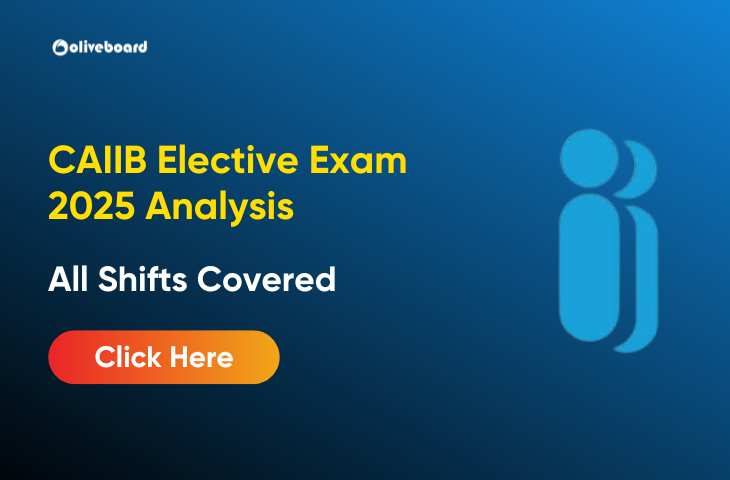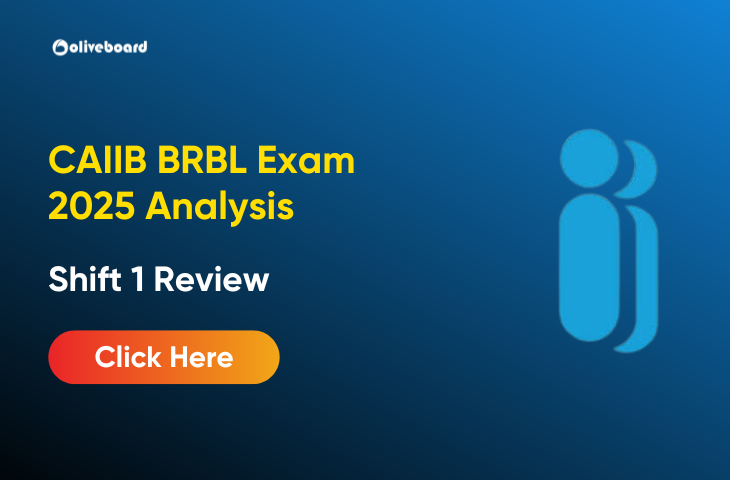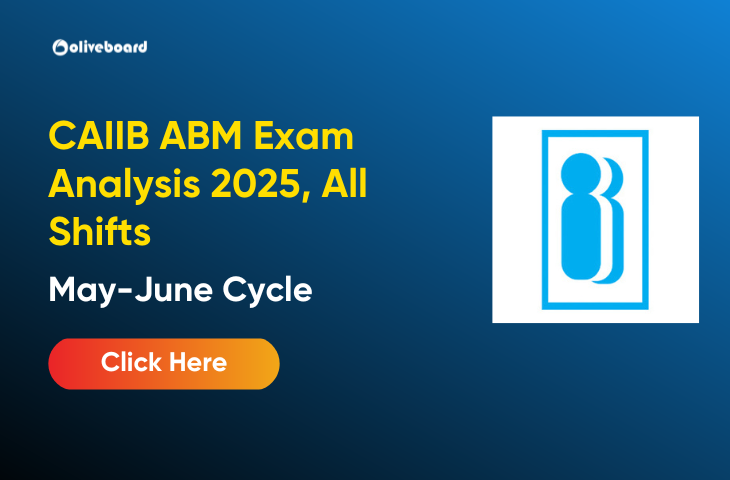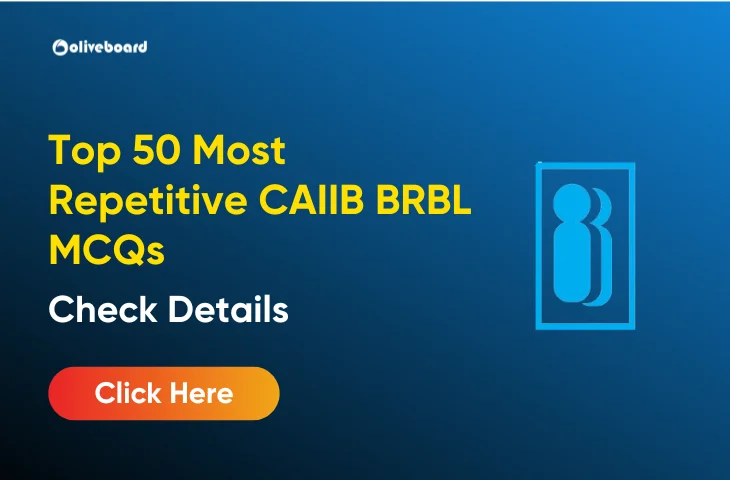Top 50 Most Repetitive CAIIB BRBL MCQs
Top 50 Most Repetitive CAIIB BRBL MCQs: The CAIIB (Certified Associate of the Indian Institute of Bankers) BRBL (Banking Regulations and Business Laws) exam is one of the most important exams for banking professionals. Scoring well in the CAIIB BRBL module requires a deep understanding of key concepts and the ability to solve multiple-choice questions (MCQs) effectively. This article provides insights into the 50 Most Repetitive CAIIB BRBL MCQs, along with tips to prepare and succeed in the exam.
Importance of CAIIB BRBL Module
The BRBL module focuses on the legal and regulatory framework that governs the banking industry. It helps candidates:
- Understand laws related to banking operations.
- Enhance their decision-making skills.
- Improve their overall professional competence.
By practicing repetitive MCQs, you can strengthen your grasp of crucial topics and boost your exam confidence.
Important Topics Covered in CAIIB BRBL
The CAIIB BRBL syllabus includes the following major topics:
- Banking Regulations:
- RBI Act, 1934
- Banking Regulation Act, 1949
- Prevention of Money Laundering Act, 2002
- Business Laws:
- Contract Act, 1872
- Negotiable Instruments Act, 1881
- Companies Act, 2013
- Banker-Customer Relationship:
- Types of customers
- KYC norms
- Recent Amendments and Updates in Laws
Benefits of Practicing Repetitive MCQs
Practicing repetitive MCQs from the BRBL module offers several advantages:
- Familiarizes you with the exam pattern.
- Helps identify frequently tested concepts.
- Improves accuracy and speed during the exam.
50 Most Repetitive CAIIB BRBL MCQ
- What is the maximum number of directors a public company can appoint without passing a special resolution?
- A) 12
- B) 15
- C) 18
- D) 10
Answer: B) 15
- Which authority is responsible for approving the appointment of an independent director in a public company?
- A) Registrar of Companies
- B) Central Government
- C) Shareholders
- D) Board of Directors
Answer: C) Shareholders
- What is the minimum number of independent directors required in a public company?
- A) 1/3rd of the total directors
- B) 1/2 of the total directors
- C) 1/4th of the total directors
- D) All directors
Answer: A) 1/3rd of the total directors
- Under the Prevention of Money Laundering Act, suspicious transactions must be reported to the FIU within how many days?
- A) 7 days
- B) 10 days
- C) 15 days
- D) 30 days
Answer: A) 7 days
- Which of the following is not a regulatory body in the Indian banking sector?
- A) RBI
- B) SEBI
- C) IRDAI
- D) Ministry of Finance
Answer: D) Ministry of Finance
- What is the maximum tenure for a managing director in a bank without RBI approval?
- A) 3 years
- B) 5 years
- C) 7 years
- D) 10 years
Answer: B) 5 years
- Which act governs the incorporation of banking companies in India?
- A) Companies Act, 1956
- B) Banking Regulation Act, 1949
- C) RBI Act, 1934
- D) SEBI Act, 1992
Answer: B) Banking Regulation Act, 1949
- Who has the authority to issue directions for the winding up of a banking company?
- A) RBI
- B) SEBI
- C) Central Government
- D) Registrar of Companies
Answer: A) RBI
- Under the SARFAESI Act, a secured creditor can take possession of assets after issuing a notice of how many days?
- A) 30 days
- B) 60 days
- C) 90 days
- D) 120 days
Answer: B) 60 days
- Which type of company is required to appoint a company secretary?
- A) Public company with a paid-up capital of Rs. 10 crore or more
- B) Private company with a paid-up capital of Rs. 5 crore or more
- C) All public companies
- D) All companies
Answer: A) Public company with a paid-up capital of Rs. 10 crore or more
- Under which section of the Companies Act, 2013 can a company be wound up by the tribunal?
- A) Section 271
- B) Section 272
- C) Section 273
- D) Section 274
Answer: A) Section 271
- What is the maximum penalty for non-compliance with the Prevention of Money Laundering Act?
- A) Rs. 1 lakh
- B) Rs. 5 lakh
- C) Rs. 10 lakh
- D) No limit
Answer: D) No limit
- Which type of charge does not require registration with the Registrar of Companies?
- A) Mortgage
- B) Pledge
- C) Hypothecation
- D) Fixed charge
Answer: B) Pledge
- Under the FEMA Act, transactions involving foreign currency fall under which category?
- A) Current Account Transactions
- B) Capital Account Transactions
- C) Both A and B
- D) None of the above
Answer: C) Both A and B
- Which act governs the amalgamation of banking companies in India?
- A) Companies Act
- B) Banking Regulation Act
- C) RBI Act
- D) SEBI Act
Answer: B) Banking Regulation Act
- Who appoints the first directors of a company?
- A) Board of Directors
- B) Articles of Association
- C) Promoters
- D) Shareholders
Answer: B) Articles of Association
- What is the maximum number of shareholders in a private limited company?
- A) 50
- B) 100
- C) 200
- D) Unlimited
Answer: C) 200
- Which document is mandatory for the incorporation of a company?
- A) Memorandum of Association
- B) Articles of Association
- C) Both A and B
- D) None of the above
Answer: C) Both A and B
- What percentage of a bank’s net demand and time liabilities (NDTL) must be maintained as SLR?
- A) 18%
- B) 25%
- C) 30%
- D) 40%
Answer: A) 18%
- Which of the following is not an essential element of a valid contract under the Indian Contract Act?
- A) Offer and Acceptance
- B) Lawful Consideration
- C) Free Consent
- D) Written Agreement
Answer: D) Written Agreement
Module A: Banking Regulations
- Which of the following is not a type of reserve under the Banking Regulation Act, 1949?
- A) Statutory Reserve
- B) Capital Reserve
- C) Reserve for Bad Debts
- D) Surplus Reserve
Answer: C) Reserve for Bad Debts
- Under the Banking Regulation Act, 1949, who can inspect the records of a banking company?
- A) RBI
- B) Income Tax Department
- C) Central Government
- D) All of the above
Answer: D) All of the above
- The Central Government can authorize a banking company to conduct its business outside India under which section of the Banking Regulation Act?
- A) Section 23
- B) Section 22
- C) Section 26
- D) Section 29
Answer: B) Section 22
- Which of the following is true regarding the limitation on the voting power of shareholders of a banking company?
- A) A shareholder can have voting power of up to 10%
- B) A shareholder can have voting power of up to 15%
- C) A shareholder can have voting power of up to 5%
- D) No limit on voting power
Answer: A) A shareholder can have voting power of up to 10%
- Who has the power to remove a director from the board of a banking company?
- A) RBI
- B) Shareholders
- C) Board of Directors
- D) Central Government
Answer: B) Shareholders
- Which of the following is the penalty for violating the provisions under the Prevention of Money Laundering Act?
- A) Fine up to Rs. 1 crore
- B) Imprisonment up to 7 years
- C) Both fine and imprisonment
- D) No penalty
Answer: C) Both fine and imprisonment
- In case of failure to comply with the Banking Regulation Act, the RBI can issue a penalty under which section?
- A) Section 42
- B) Section 49
- C) Section 45
- D) Section 47
Answer: B) Section 49
- A company must file its annual return with the Registrar of Companies within how many days of holding the AGM?
- A) 15 days
- B) 30 days
- C) 60 days
- D) 90 days
Answer: B) 30 days
- Which of the following is a type of breach under the Companies Act, 2013?
- A) Failure to file financial statements
- B) Not maintaining a register of shareholders
- C) Not holding the AGM
- D) All of the above
Answer: D) All of the above
- Under the Income Tax Act, what is the penalty for non-disclosure of foreign assets?
- A) Rs. 50,000
- B) Rs. 100,000
- C) Rs. 500,000
- D) Rs. 1,000,000
Answer: C) Rs. 500,000
- Which of the following is covered under the SARFAESI Act for the recovery of defaulted loans?
- A) Agricultural loans
- B) Loans to government entities
- C) Secured loans
- D) Unsecured loans
Answer: C) Secured loans
- Under the Companies Act, 2013, what is the minimum number of directors required for a public company?
- A) 2
- B) 3
- C) 4
- D) 5
Answer: B) 3
- What is the maximum fine under the FEMA Act for unauthorized foreign exchange transactions?
- A) Rs. 5 lakhs
- B) Rs. 10 lakhs
- C) Rs. 25 lakhs
- D) Rs. 2 crores
Answer: D) Rs. 2 crores
- Who has the authority to issue guidelines for the management of Non-Performing Assets (NPAs)?
- A) SEBI
- B) RBI
- C) Ministry of Finance
- D) IBA
Answer: B) RBI
- Under the Companies Act, 2013, what is the maximum tenure for an independent director?
- A) 2 terms of 3 years each
- B) 1 term of 5 years
- C) 3 terms of 5 years each
- D) 1 term of 3 years
Answer: A) 2 terms of 3 years each
- Which of the following is true about the liquidation process of a banking company?
- A) It can only be initiated by RBI
- B) Shareholders cannot request liquidation
- C) The process can be initiated by the company’s creditors
- D) Liquidation is prohibited for banking companies
Answer: C) The process can be initiated by the company’s creditors
- Under which section of the Companies Act can a company be dissolved by the tribunal?
- A) Section 271
- B) Section 272
- C) Section 273
- D) Section 274
Answer: A) Section 271
- What is the maximum penalty for fraudulent conduct by a director under the Companies Act?
- A) Rs. 10 lakh
- B) Rs. 50 lakh
- C) Rs. 1 crore
- D) Rs. 5 crore
Answer: C) Rs. 1 crore
- In case of a conflict between the articles of association and the memorandum of association, which document prevails?
- A) Articles of association
- B) Memorandum of association
- C) Both documents
- D) None of the above
Answer: B) Memorandum of association
- What is the procedure to be followed in case of a suspected fraudulent transaction in a bank under PMLA?
- A) The bank must report to RBI
- B) The bank must report to the police
- C) The bank must file a Suspicious Transaction Report (STR) to FIU-IND
- D) The bank can take internal action without reporting
Answer: C) The bank must file a Suspicious Transaction Report (STR) to FIU-IN
- Which act regulates the issue of currency notes in India?
- A) RBI Act, 1934
- B) Companies Act, 1956
- C) Indian Penal Code
- D) Negotiable Instruments Act, 1881
Answer: A) RBI Act, 1934
- The maximum amount of deposit a person can place in a savings account is governed by which regulation?
- A) RBI Guidelines
- B) Banking Regulation Act
- C) FEMA
- D) Income Tax Act
Answer: A) RBI Guidelines
- Under the RBI Act, 1934, what is the maximum limit of reserves that can be held by RBI?
- A) 20%
- B) 25%
- C) 30%
- D) No limit
Answer: D) No limit
- Which of the following is true about the interest rate on loans provided by banks to customers?
- A) Banks are free to set interest rates without RBI intervention
- B) Interest rates are strictly regulated by RBI
- C) Banks can set interest rates based on the market condition
- D) RBI decides the interest rate for each bank
Answer: C) Banks can set interest rates based on the market condition
- Which document is mandatory for opening a bank account as per KYC norms?
- A) PAN card
- B) Aadhaar card
- C) Voter ID
- D) All of the above
Answer: D) All of the above
- Which authority is responsible for regulating the foreign exchange market in India?
- A) RBI
- B) SEBI
- C) IRDAI
- D) Ministry of Finance
Answer: A) RBI
- In which case can the RBI cancel a banking license?
- A) If the bank is found involved in criminal activities
- B) If the bank fails to maintain adequate capital
- C) If the bank does not meet the prescribed prudential norms
- D) All of the above
Answer: D) All of the above
- Which of the following is true about a Non-Banking Financial Company (NBFC)?
- A) NBFCs are not allowed to accept demand deposits
- B) NBFCs can offer checking accounts
- C) NBFCs are regulated by RBI in the same way as banks
- D) NBFCs can issue currency notes
Answer: A) NBFCs are not allowed to accept demand deposits
- What is the primary purpose of a bank’s credit policy?
- A) To determine interest rates on loans
- B) To provide financial support to government projects
- C) To ensure profitability and minimize risks
- D) To ensure compliance with all legal norms
Answer: C) To ensure profitability and minimize risks
- Who appoints the statutory auditors of a banking company?
- A) RBI
- B) Central Government
- C) Shareholders
- D) Board of Directors
Answer: C) Shareholders
Preparation Tips for CAIIB BRBL
1. Understand the Syllabus
- Begin by thoroughly studying the syllabus. Focus on key laws like the Banking Regulation Act, RBI Act, and Contract Act.
2. Practice Repetitive MCQs
- Revisit questions from past exams. The more you practice, the better your understanding of the concepts.
3. Use Trusted Study Materials
- Rely on books and online resources recommended by experts.
- Enroll in mock tests to assess your performance.
4. Time Management
- Allocate sufficient time to each topic.
- Practice solving MCQs within a set time to simulate the exam environment.
5. Stay Updated
- Keep track of recent amendments and changes in banking laws.
Resources for CAIIB BRBL Preparation
- Books:
- “Legal and Regulatory Aspects of Banking” by IIBF
- Reference guides on business laws
- Online Platforms:
- Enroll in CAIIB courses offered by reputed coaching institutions.
- Download question banks for regular practice.
- Mock Tests:
- Attempt sectional and full-length mock tests to evaluate your readiness.
Why Focus on Repetitive MCQs?
Repetitive questions in the CAIIB BRBL module indicate high-priority topics. By focusing on them, you:
- Save time during preparation.
- Ensure better performance on exam day.
Conclusion
Preparing for the CAIIB BRBL exam requires consistency, focus, and smart practice. The 50 Most Repetitive CAIIB BRBL MCQs offer a reliable way to cover essential topics and improve your scores. Use the tips and resources shared in this article to streamline your preparation and achieve success in the CAIIB exam.
Also Check:
| Related Article | Link |
| CAIIB BRBL Questions | Click here to Check |
| Top 50 Most Repetitive CAIIB ABM MCQs | Click here to Check |
| CAIIB ABM Exam Important MCQs | Click here to Check |
| 50 Most Repetitive CAIIB BFM MCQs | Click here to Check |
| Top 50 Most Repetitive CAIIB ABFM MCQs | Click here to Check |
- CAIIB Electives Exam Analysis 2025, June All Shifts Review

- CAIIB BRBL Exam Analysis 2025, June All Shifts Review

- CAIIB ABFM Exam 2025 Analysis, Shift 1 & 2 – 22nd June 2025

- CAIIB BFM Exam Analysis 2025, All Shift Analysis Released

- CAIIB ABM Exam Analysis 2025, All Shifts, May-June Cycle

- CAIIB Admit Card 2025, Check Steps to Download Call Letter


Hello there! I’m a dedicated Government Job aspirant turned passionate writer & content marketer. My blogs are a one-stop destination for accurate and comprehensive information on exams like Regulatory Bodies, Banking, SSC, State PSCs, and more. I’m on a mission to provide you with all the details you need, conveniently in one place. When I’m not writing and marketing, you’ll find me happily experimenting in the kitchen, cooking up delightful treats. Join me on this journey of knowledge and flavors!
